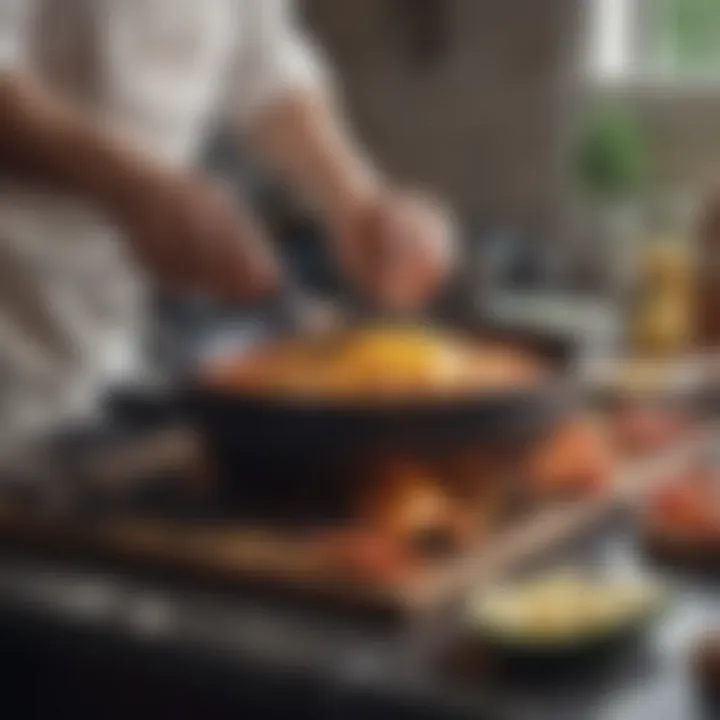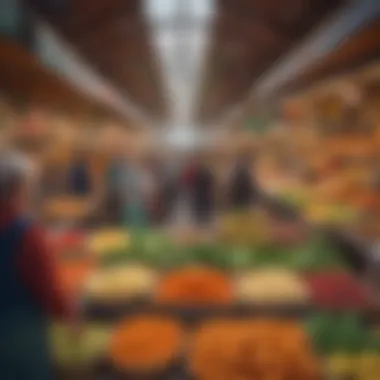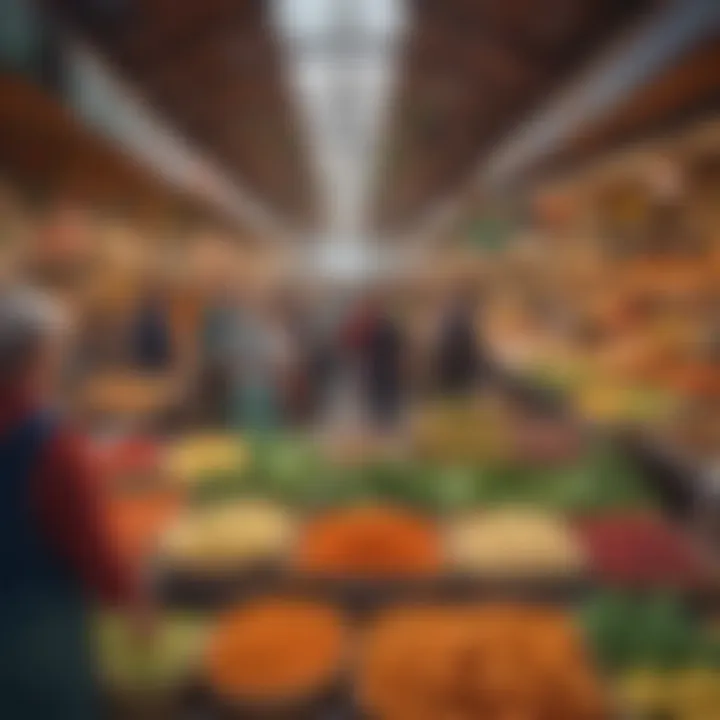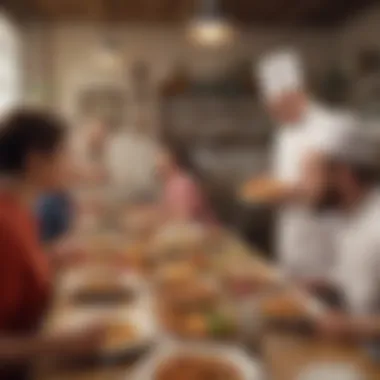Examining Michael Pollan's 'Cooked': Food and Culture


Intro
Michael Pollan's book, Cooked, navigates the intricate tapestry of food, culture, and the human experience. Pollan, an acclaimed author and food advocate, doesn’t merely scratch the surface; he digs deep into the essence of culinary practices. Through the lens of cooking, he interrogates our relationship with what we eat, unearthing the ties that bind us to nature, community, and oneself.
The narrative is woven with personal anecdotes, historical contexts, and cultural reflections that provide a rich texture to the reader's understanding of food beyond mere sustenance. Pollan’s thoughtful observations act as a mirror, prompting us to scrutinize not just the ingredients we choose but also the significance those choices hold within a larger societal framework. This exploration is particularly relevant in today's fast-paced world, where culinary traditions often get overshadowed by convenience and haste.
In Cooked, Pollan categorizes the act of cooking into four elemental themes: fire, water, air, and earth. Each theme serves as a metaphor for both the physical and spiritual aspects of cooking. By dissecting these elements, he illustrates the transformative power of cooking—not only in terms of food preparation but also as a rite of passage that fosters connections with those around us.
Food choices echo our values and beliefs. Pollan encourages readers to reflect on how they cook and, more importantly, why they cook. The journey through Cooked isn't just an exploration of recipes or techniques; it invites introspection and a reevaluation of our culinary habits.
To appreciate Pollan's work fully, it is helpful to categorize the book's elements, setting the stage for a deeper analysis of the lessons it imparts.
Prelims to Michael Pollan and 'Cooked'
Understanding the importance of cooking extends far beyond the mere act of preparing food; it embodies reflections of culture, community, and the very essence of human experience. Michael Pollan, a prominent voice in the discourse surrounding food, tackled these intricate connections head-on in his work, Cooked. This book serves as a lens through which we can examine not just what we eat, but how the processes of cooking shape our identities and values.
Pollan’s approach encourages readers to reconsider their own culinary practices and understand the broader implications of their food choices. Each chapter offers a unique element of cooking—be it fire, water, air, or earth—drawing parallels not only to the art of cooking but also to the core of human existence.
This exploration is timely, especially in today's fast-paced world where convenience often overshadows the intrinsic meanings of food preparation. Diving into Pollan's insights can rekindle an appreciation for traditional cooking methods while inviting individuals to reflect on their relationship with food.
Who is Michael Pollan?
Michael Pollan is more than just an author; he is a cultural commentator who delves deeply into the relationships between food, nature, and society. A professor of journalism at the University of California, Berkeley, Pollan has been a staple in food journalism, bringing attention to issues around food production, consumption, and ecological sustainability. His writing style is accessible yet thought-provoking, often blending personal anecdotes with rigorous research.
Pollan has authored several influential books, including The Omnivore's Dilemma and In Defense of Food, which examine the complex food systems in which we live. His work challenges the reader to think critically about what they eat and why, unearthing the cultural and ethical implications behind food choices. In Cooked, he invites us to reconnect with the basic element of cooking, emphasizing its role as a fundamental human practice.
Context and Purpose of 'Cooked'
Pollan's Cooked emerges in a specific context where industrial food systems have largely taken precedence over traditional culinary techniques. It serves not only as a guide to various cooking methods but also as a philosophical exploration of the significance of cooking itself. The purpose of the book is multi-faceted; it seeks to educate readers about the four classical elements of cooking while simultaneously challenging them to reflect on their culinary habits.
Through a blend of personal narrative and cultural critique, Pollan stresses that cooking is not merely a functional activity. Instead, it is deeply embedded in our communal and family lives. In an age marked by convenience and fast food, Pollan’s work offers a reminder of the values inherent in preparing meals from scratch, emphasizing connection—both with the ingredients and those we share meals with.
In essence, Cooked serves as an invitation to reclaim the kitchen as a space for creativity, reflection, and connection. Through this book, Pollan posits that cooking has the potential to restore balance in our lives, bridging the gap between nature and our hectic, modern existence.
The Structure of 'Cooked'
Understanding the structure of Michael Pollan's Cooked is key to grasping the deeper meanings embedded within its pages. Pollan does not simply present cooking as a set of instructions but rather constructs a narrative that intertwines the art of cooking with the essence of human culture. The four elements of cooking – fire, water, air, and earth – serve as foundational blocks that not only enhance our culinary experiences but also reflect our connections to nature and community. Each element embodies unique characteristics that contribute to Pollan's exploration of cooking and its impact, making the structure of this work both significant and multifaceted.
Four Elements of Cooking
Fire
Fire is often seen as the primal force in cooking, representing transformation and energy. It is the element that brings forth the magic of cooking. Whether roasting, grilling, or baking, fire gives food a taste and texture that is simply unattainable through any other means. The essential aspect of fire lays in its ability to not just cook but also to infuse flavors, creating a profound sensory experience.
One could argue that fire is the beating heart of culinary creativity, creating drama and excitement in the kitchen. It has a unique ability to make the mundane extraordinary. Imagine a steak sizzling over an open flame or the comforting smell of baked goods wafting out of an oven – there lies the soul of cooking. However, the power of fire also comes with its quirks; it demands attention and respect. If not handled properly, it can easily lead to burnt dishes or worse, hazardous situations. Thus, in Pollan's framework, fire serves as both a tool and a symbol of culinary passion and caution.
Water
Next up is water, a silent yet powerful force in the kitchen. It plays a vital role in various cooking techniques, from boiling to steaming and sautéing. Water is essential in the process of extraction, where it helps release flavors and nutrients from ingredients. It can transform dry grains into steamy risottos or turn fresh vegetables into vibrant soups.
A key characteristic of water resides in its capacity to symbolize purity and clarity. Cooking with water can enhance the natural flavors of ingredients without masking them, providing a healthier approach to meal preparation. However, reliance on water comes with its own set of challenges; overcooking can extract too much moisture, leaving dishes bland or mushy. In the context of Pollan's work, water represents both nourishment and the delicate balance of attentiveness required in cooking.
Air
The element of air is often overlooked, yet its importance cannot be understated. It embodies the lightness and elevation in cooking – think of airy soufflés or fluffy breads, which depend on the skillful incorporation of air. This element represents not only the physical aspect of cooking but also the emotional, symbolizing rise and hope in the culinary journey.
Air conveys that sense of expansion and freedom that can be found in cooking. It showcases creativity, allowing chefs to push boundaries and reinvent traditional recipes. The downside, however, is that air can make cooking precarious. A dish too full of air risks collapsing, just as any creative endeavor can falter without a solid foundation. In Pollan’s narrative, air illustrates the delicate dance of aspiration and reality.


Earth
Lastly, earth is fundamentally tied to the concept of ingredients and sustainability. It encompasses everything that grows from the soil – fruits, vegetables, grains, and herbs. Pollan draws attention to the origins of our food, encouraging readers to reconnect with local farms and the seasons. Understanding the earth's cycles enables better choices about what we cook and eat, instilling respect for the environment and food sources alike.
Earth symbolizes stability and grounding in cooking, providing nourishment that sustains life. Ingredients grown in healthy soil, nurtured by nature, not only taste better but also carry the history and culture of their place of origin. However, a focus on earth also raises questions about modern agricultural practices and their impact. In Cooked, Pollan emphasizes the significance of knowing where our food comes from, ultimately advocating for a return to foundational cooking practices that honor the land.
Interdisciplinary Approach
Pollan's interdisciplinary approach weaves together culinary techniques with insights from history, anthropology, and science. This richness adds depth to the reading experience, as it portrays cooking as not merely a task but an act steeped in tradition and modernity. By blending these various fields of study, Pollan invites readers to see cooking as the ultimate intersection of art and science, providing a holistic perspective on an age-old practice.
Cultural Reflections in Cooking
Cultural reflections in cooking represent a significant aspect of how we understand food and its role in our lives. Michael Pollan's work in 'Cooked' emphasizes that cooking is not merely a functional task; it is deeply woven into the fabric of our cultural identity. Each ingredient tells a story, and each recipe is a thread that connects us with our past, our community, and ourselves. Understanding these reflections helps us recognize the impact our food choices have on our health, our relationships, and our environment. The act of cooking can serve as both a mirror and a bridge, revealing insights about our values and linking us to broader societal themes.
Cooking as Cultural Ritual
Cooking often takes on the role of a cultural ritual, embodying traditions that transcend generations. Many individuals and communities view the process of cooking not just as a means to nourish the body but as a sacred activity that strengthens bonds with loved ones. For instance, during family gatherings, the kitchen transforms into a vibrant epicenter. The sounds of clattering utensils, the aromas wafting through the air, and the shared laughter create a unique atmosphere that fosters connection and engagement.
Traditions such as family holiday feasts or regional food festivals exemplify this ritualistic aspect. People come together to prepare meals passed down through familial lines, showcasing the importance of heritage. Cooking together allows for storytelling, where elders pass on wisdom while younger generations learn the nuances tied to their food culture. The act of cooking as a ritual allows for reflection and appreciation of one's roots and also makes the meal become an event rather than just a simple act of eating.
Communal Aspects of Meal Preparation
The communal aspects of meal preparation add another layer to the significance of cooking. When people gather to cook, they are doing more than just mixing ingredients. They are sharing experiences, fostering relationships, and enhancing their social networks. In many cultures, communal cooking encourages collaboration and involves roles that everyone contributes to, reinforcing a sense of belonging.
The benefits of communal cooking can be manifold:
- Strengthening Relationships: Working together can deepen connections among families, friends, and community members.
- Learning Opportunities: Participants can exchange knowledge about various cooking techniques and ingredients, helping preserve culinary skills and traditions.
- Enhanced Enjoyment: Cooking in numbers often leads to laughter, joy, and a more enjoyable experience overall.
In Pollan's narrative, these communal cooking experiences remind us of the shared human experience that cuisine fosters. It brings people closer, allowing them not only to feed their bodies but also their spirits.
"When we gather around the table, we are not just sharing a meal; we are sharing our lives and our stories."
With these aspects of cooking as cultural refrains, we can see how deeply our culinary practices resonate with our identities and societal values. Through thoughtful engagement with these rituals, we can encourage more meaningful interactions with food and one another.
The Importance of Ingredient Awareness
In a world where fast food dominates the landscape and convenience often trumps quality, understanding the importance of ingredient awareness becomes critical. This concept goes beyond merely knowing what is on a label; it represents a deeper engagement with the very essence of our food. Recognizing the source of our ingredients is essential, as it can inform our cooking practices and enhance our appreciation of the meals we prepare.
Understanding Food Sources
Food sourcing is about tracing back each ingredient to its origin. This awareness allows cooks, whether home chefs or culinary professionals, to make more informed choices. Buying locally sourced ingredients often supports small farmers and reduces the carbon footprint associated with transportation. For example, when choosing vegetables, opting for those grown in community gardens can foster a bond with the local ecosystem, enriching one's understanding of seasonal cycles.
Delving into the complex supply chains of foods reveals more than just costs; it opens a window to the ethical considerations affecting farmers, the environment, and even our health. Pollan emphasizes that knowing where your food comes from cultivates respect for the work that goes into growing it.
"When you cook with intention and awareness, you create a connection not only to the food, but to the hands that brought it to your table."
This sentiment captures the heart of Pollan's message: cooking is not an isolated act but a ritual deeply embedded in both personal and cultural narratives.
Seasonality and Sustainability
Seasonality is a concept that revolves around eating foods when they are at their best, both in terms of flavor and nutrient content. Ingredients available in their season are often less expensive and more robust than their out-of-season counterparts. For instance, tomatoes grown in summer will burst with flavor compared to those that have traveled thousands of miles from greenhouses in winter. Culinary choices based on seasonality can encourage sustainability.
Sustainable practices extend beyond seasonal choices; they encompass mindful cooking techniques that honor ingredients' integrity. For example, fermentation is one method that aligns with sustainability, allowing us to preserve foods while simultaneously enhancing their flavors and health benefits. In this light, understanding ingredient dynamics not only elevates our culinary experience but also promotes a more environmentally friendly lifestyle.
Cooking as Therapeutic Practice
In Michael Pollan's exploration of food and its multifaceted role in our lives, one recurring theme stands out: cooking as a means of therapy. It's not merely an act of preparing meals but rather a profound practice that aids in mental and emotional well-being. This section delves into the specifics of how culinary engagement serves as a mental balm, addressing mindfulness and stress relief through culinary arts.


Mindfulness and Cooking
When we talk about mindfulness, we often envision meditation or quiet reflection. However, cooking can immerse individuals in a state of mindfulness too. The rhythmic chopping of vegetables, the fragrant aroma of herbs, or the gentle simmering of a sauce can draw you into the present moment. Engaging with these sensory experiences grounds you, allowing the mind to disperse its chaotic musings while focusing on the task at hand.
Cooking mindfully brings several benefits:
- Heightened Awareness: Paying attention to each step of the cooking process fosters a deeper connection between the cook and the ingredients.
- Calmness: The meticulous nature of cooking can induce a kind of relaxation, serving as a counterbalance to a hectic lifestyle.
- Creativity: Allowing yourself to play with flavors and textures can reignite creative sparks that might have faded in daily routines.
"Cooking is like a meditation; you focus on the task and forget your troubles, if only for a while."
This statement encapsulates the therapeutic benefits that Pollan emphasizes in his work.
Stress Relief through Culinary Arts
Incorporating cooking into daily life can be an effective method for reducing stress levels. The act of creating something, whether it's a simple meal or an elaborate dish, offers a tangible sense of achievement. In a world often beset by uncertainty, cooking grants a measure of control over one’s environment.
Some practical ways cooking alleviates stress include:
- Engagement in Routine: Establishing a regular cooking schedule can build a comforting rhythm in life. Knowing when and what you’ll be cooking can reduce anxiety related to meal planning.
- Physical Activity: The physical aspects of cooking, from kneading dough to stirring pots, engage the body and release endorphins. This natural chemical boost can elevate mood and diminish stress.
- Social Connection: Cooking often becomes a communal activity, whether it's inviting friends over for dinner or simply sharing a recipe. This social aspect can generate feelings of belonging and support—a vital antidote to stress.
In essence, Pollan’s reflections on cooking reveal its hidden potential as a therapeutic tool. Just as we tend our own gardens, investing time into preparing meals nurtures not only our bodies but our minds as well.
Traditional Techniques and Modern Adaptations
In today's fast-paced world, the art of cooking often faces challenges from convenience and technology. However, the balance between traditional techniques and modern adaptations plays a crucial role in how we approach food and culinary practices. Michael Pollan's exploration in 'Cooked' highlights that by reviving time-honored methods, we reconnect with the profound cultural roots of cooking while simultaneously adapting to contemporary lifestyles. This section delves into specific elements of these techniques, their benefits, and the considerations that need to be taken into account in modern cooking.
One of the primary benefits of focusing on traditional techniques is the preservation of cultural heritage. Cooking practices passed down through generations carry stories, wisdom, and skills that reflect a community's identity. When we take the time to learn these techniques, we also acknowledge their significance, creating a deeper appreciation for what the act of cooking entails.
Moreover, traditional methods often encourage a more hands-on approach, fostering mindfulness during the cooking process. In Pollan's narrative, there’s a strong emphasis on how engaging actively in cooking can enhance not just the taste of food but also the overall experience of preparing a meal. Here, the journey through cooking becomes just as vital as the final product on the table.
However, it would be remiss to ignore the advantages that modern adaptations bring to the culinary landscape. For instance, the advent of technology inspires innovative cooking methods, which can save time and diversify flavors without compromising the essence of the original techniques. It becomes an intriguing dance between the old and the new.
Fermentation: A Case Study
Fermentation serves as a vivid illustration of the intersection between traditional practices and modern culinary innovations. This age-old process not only extends the shelf life of foods but also enhances their nutritional value. Foods like sauerkraut, kimchi, and yogurt have been staple items in various cultures for centuries and are suddenly making a massive resurgence in contemporary kitchens.
When one engages in the process of fermentation, whether it’s for producing a tangy batch of kimchi or brewing kvass, it requires a level of patience and attention that our rushed lives often bypass. The understanding of utilizing beneficial bacteria and creating favorable environments for fermentation fosters a sense of control over what we consume.
Practically speaking, fermentation is not just about following a formula; it's a cultural dialogue between the chef and the ingredients, where the temperature, moisture levels, and time play pivotal roles. As an excellent case study, there is something immensely rewarding about the slow transformation of simple ingredients into complex flavors. It showcases how time-honored practices can be seamlessly woven into today's culinary fabric.
Reviving Lost Culinary Skills
In the vast sea of food trends, many essential culinary skills have begun to fade into obscurity. Upon reflecting on Pollan's observations, it begs the question—what are we losing when we forsake these skills? Skills like butchering, pickling, and even baking from scratch seem to be fading amidst a tide of pre-packaged convenience. By reviving these lost abilities, we gain not just independence from commercial food systems but also a profound connection to the foods we consume.
Moreover, honing these skills can lead to healthier eating habits. When individuals take the plunge to prepare food from raw ingredients, they often find themselves more aware of what goes into their meals. This awareness leads to more informed choices, encouraging the selection of fresh, local, and often seasonal ingredients.
As an engaging process, reviving these lost skills aligns perfectly with the modern ethos of sustainability and self-sufficiency. For many home cooks, the appeal lies in the rediscovery of pleasure in food preparation—the thrill of kneading dough or the satisfaction of making a comforting batch of stock from scratch.
"Living well, cooking with intention, and savoring what comes of it must be the ultimate art of cooking."
Through such reflections, the impact extends beyond just the kitchen, influencing personal health and even societal food trends.
Personal and Societal Impacts of Cooking
Cooking stands as a cornerstone of human experience, shaping not just our individual health but also our broader societal fabric. In Michael Pollan's work, "Cooked," the act of preparing food transcends mere sustenance. It manifests as a profound ritual, influencing our connections to self, community, and the environment. This intersection of personal and societal dynamics reinforces the significant impacts cooking has on our lives, inviting a closer look at both individual health outcomes and collective food trends.
Individual Health Outcomes
Every time we step into the kitchen, we engage in a practice that exerts tangible effects on our physical well-being. Home-cooked meals often trump their processed counterparts. Pollan emphasizes this shift from pre-packaged food to fresh ingredients, underscoring how our cooking choices directly correlate with our health.


Cooking at home allows individuals to control what goes into their meals, promoting healthier eating habits. With ingredients fresh from local farmers' markets or even our gardens, we can easily avoid excessive sugars and unhealthy fats that are prevalent in ready-to-eat meals. To underscore this point, consider that a simple vegetable stir-fry with seasonal produce packs more nutrients than a takeout meal, often high in unhealthy additives.
"Eating real food, the kind that is grown, not manufactured, is the first step toward a healthier life."
Another aspect worth noting is the connection between meal preparation and mental health. Numerous studies point to the calming effects of cooking. Engaging with the tactile elements of food—chopping vegetables, kneading dough—can offer stress relief and promote mindfulness. By making a habit of preparing meals ourselves, many find a creative outlet that fosters well-being.
Societal Food Trends and Issues
As more people dive into cooking at home, a ripple effect can be observed in society. Trends shift, informed by our collective choices in food preparation and consumption. The resurgence of interest in artisanal products, traditional techniques, and sustainable sourcing provides a powerful lens through which to view contemporary cooking practices.
Pollan highlights a concerning trend toward monoculture in agriculture, stemming primarily from industrial farming practices. The consequence is not just a lack of choice but a direct threat to biodiversity, nutrition, and soil health. By opting for locally-sourced and seasonal ingredients, individuals contribute to a more robust marketplace that values diverse agricultural practices and climate-appropriate food systems.
Additionally, the phenomenon of “food deserts” continues to plague urban landscapes. These areas, characterized by limited access to fresh produce and nutritious foods, reflect systemic inequalities that inhibit healthy cooking practices. Pollan advocates for community gardens and food cooperatives as ways to empower neighborhoods, addressing the imbalance and promoting a culture of cooking that prioritizes health and sustainability.
Connecting Past and Present
In today's fast-paced world, where convenience often trumps tradition, understanding the connection between past and present in cooking is vital. It not only allows us to appreciate the rich culinary heritage that informs our current practices but also underlines the continuous evolution of our relationship with food. Acknowledging the historical context of cooking enables individuals to engage more meaningfully with their culinary choices. It serves as a reminder of the cultural significance embedded in the act of preparing and sharing meals, influencing contemporary trends and personal practices.
Historical Context of Cooking Practices
To grasp how cooking has changed over time, one must look back at its roots. Early humans relied on natural resources for sustenance, and the skills they developed were critical for survival. Cooking was not merely about nourishment; it was a communal experience that brought people together, fostering relationships and sharing cultural stories. Take, for instance, the way indigenous tribes celebrated seasonal harvests with elaborate rituals honoring their food sources. Such practices show how essential cooking has been as a social glue, preserving traditions through generations.
- Traditional Techniques: Many techniques used in ancient cuisines still influence modern cooking, such as roasting and fermenting. These methods are not just remnants of the past; they often come with health benefits, tying back to Pollan's emphasis on the importance of ingredient awareness.
- Cultural Significance: The way food is prepared often reflects the values of a society. Festive dishes prepared during religious ceremonies offer insights into the beliefs and practices of various cultures, creating a tapestry of culinary narratives.
In examining these historical practices, readers may find parallels to their own cooking habits, leading to greater awareness and appreciation of food as a cultural artifact.
Evolution of Culinary Culture
As societies progressed, so too did their culinary traditions. The evolution of culinary culture encompasses technological advancements, globalization, and cultural exchanges that have shaped our modern food landscape.
- Technological Advances: The introduction of appliances, like refrigerators and microwaves, has altered meal preparation. While they provide convenience, they have also led to a disconnection from time-honored practices, impacting how meals are perceived and enjoyed.
- Global Influences: Cultural diffusion has brought diverse flavors and techniques into kitchens worldwide. For example, Italian pasta-making techniques influence American home cooks, while Asian methods of fermentation have found a strong foothold in contemporary culinary circles. This blending of culinary practices illustrates how interconnected we have become in our gastronomy.
"The evolution of food practice is not just about what we cook; it's about who we are and how we connect with each other."
Ultimately, Pollan’s insights challenge readers to reflect on how these historical threads weave through their own cooking. Understanding the past can illuminate the ways food choices impact health, the environment, and community ties in the present. The journey through culinary history is not an isolated exploration but an invitation to partake in a richer, more meaningful culinary experience.
End: The Broader Implications of 'Cooked'
Michael Pollan’s Cooked extends far beyond mere recipes and cooking techniques; it holds a mirror to society, encouraging a deeper examination of our culinary habits and their impact on our lives. In assessing the importance of cooking, Pollan delves into the interconnectedness of food, culture, and individual health, making a compelling case for why engaging with the act of cooking is essential in today’s fast-paced world. This reflection reveals not only personal insights but also broader societal implications that resonate through the ages.
Reflections on Personal Cooking Journeys
Every person’s culinary journey is unique, shaped by cultural backgrounds, family traditions, and personal experiences. Reflecting on one’s cooking story opens avenues to understand not just how we prepare meals but why we do it in the first place. Whether it’s the comforting aroma of a grandmother’s stew simmering on the stove or the thrill of experimenting with new spices, these personal narratives enrich our appreciation for food.
Pollan prompts readers to consider their own paths:
- Nostalgia: How do certain meals evoke memories?
- Learning: What skills have you developed in the kitchen?
- Sharing: How does cooking for others strengthen bonds?
By inviting such reflections, Pollan triggers a deeper comprehension of cooking as a form of self-expression and connection. When individuals contemplate their culinary histories, they emerge with a more profound respect for the ingredients they use and the recipes they follow.
Future Directions in Culinary Practices
Looking ahead, it’s essential to consider how our cooking practices might evolve amidst changing societal norms, technology, and environmental challenges. Pollan underscores the need for steering culinary culture toward more sustainable and conscious choices that resonate with our growing awareness of global food systems.
Some potential future trends include:
- Increasing Local Sourcing: As community connections deepen, the push for locally sourced ingredients will gain momentum, fostering relationships between farmers and consumers.
- Emphasis on Plant-Based Cooking: Given rising concerns about climate change, more people might shift toward vegetarian or vegan diets, exploring the vast world of plant-based ingredients.
- Revival of Traditional Techniques: In a bid to reconnect with culinary roots, folk methods like fermentation may gain popularity, offering health benefits alongside rich flavors.
As we contemplate these changes, Pollan’s Cooked serves as a foundation for critical discussions around food ethics, sustainability, and health. It emphasizes not only individual choices but also collective action, urging us to rethink our roles in shaping a food culture that honors tradition while embracing innovation.
"The experience of cooking is not just about making food; it’s about connecting with each other and the world around us."
The broader implications of Cooked remind us that cooking is already so much more than a necessity; it is, in many respects, an art of living. Pollan's work encourages readers to take action, whether by revisiting their heritage in the kitchen, considering the sustainability of their choices, or simply finding solace in the act of cooking. This transformative power of food action is a significant takeaway that will inspire current and future generations.



